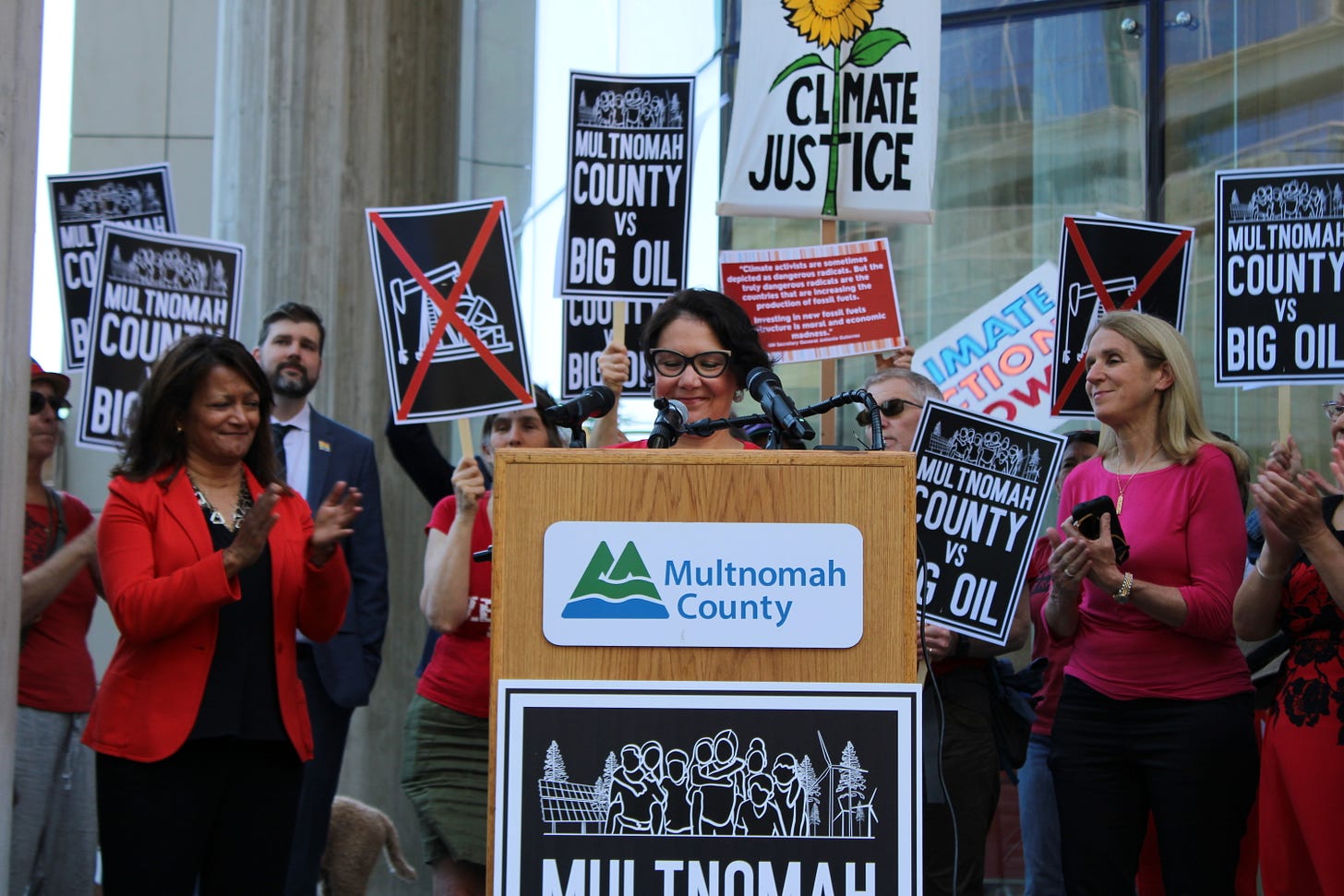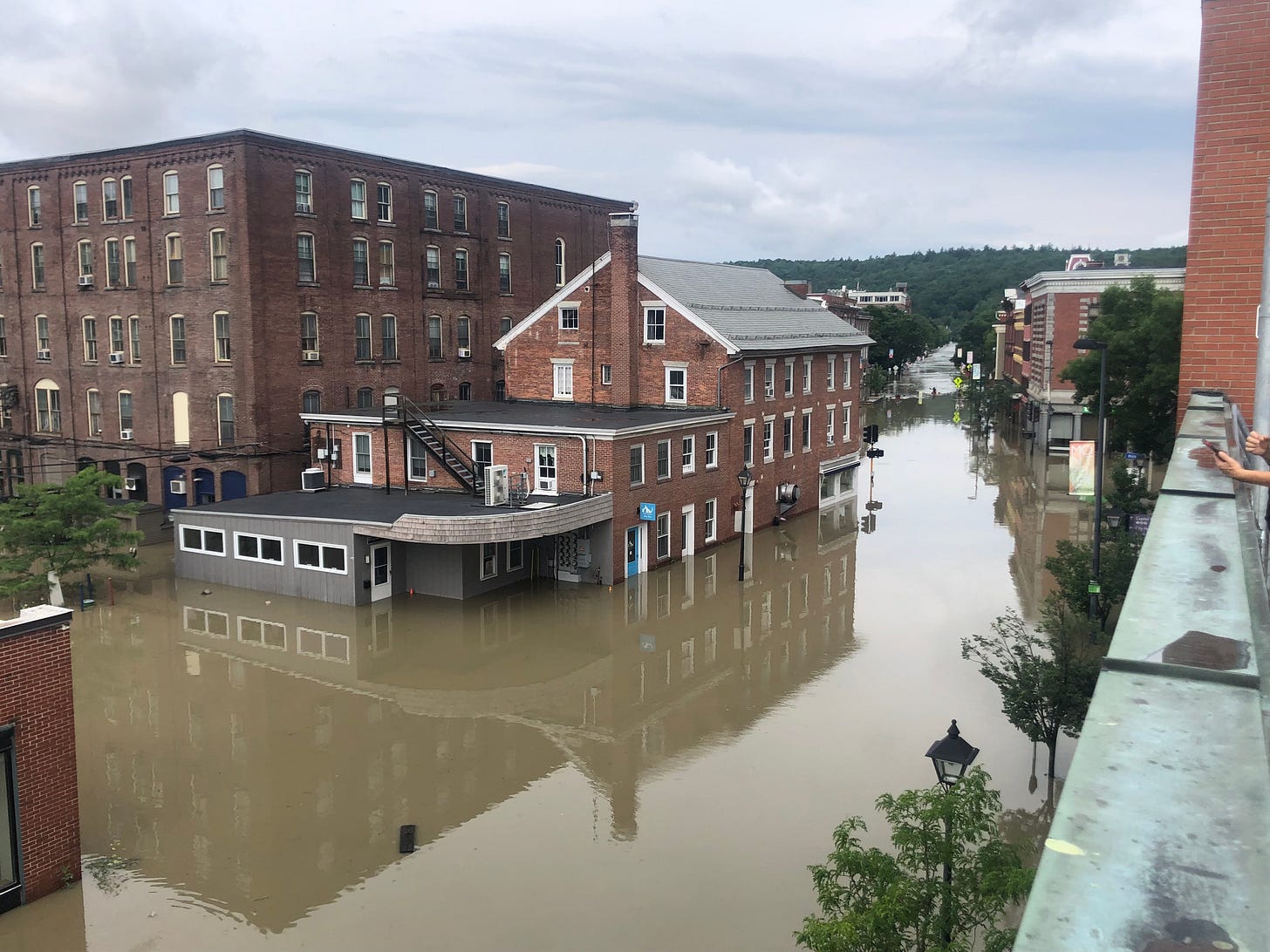In 2023, climate accountability proved essential
We’re taking a look back at the past year in ExxonKnews.
Emily Sanders is the Center for Climate Integrity’s editorial lead.
With the end of an oil-and-gas-captured COP that marked a global agreement to 'transition away' from fossil fuels but failed to secure a real commitment to their phase-out, 2023 is a wrap.
COP28 was only more proof that without accountability for the industries, corporations, and executives fueling the climate crisis, profit-driven polluters will remain the most powerful barrier to meaningful progress.
And that’s exactly why, even as the climate crisis grows deadlier every year and oil executives are still using their political might to ensure it stays that way, writing ExxonKnews gives me hope. Looking back on the year, it’s hard not to envision a future in which those executives, instead of being welcomed into climate negotiations and awarded for a PR job well done, are sitting on witness stands.
Maybe reading gave you some hope too, or at least helped you keep tabs on Big Oil’s fast-operating disinformation machine and the growing momentum of efforts to reign it in.
And with that, let’s look back at some of the highlights from our coverage this past year:
New evidence shed light on Big Oil’s climate deception.
This year, reporters and researchers uncovered more internal company documents detailing the fossil fuel industry’s decades-long strategy to deny climate science and delay action.
We saw the first ever peer-reviewed analysis of an oil company’s climate models, showing that Exxon’s early projections of global heating were spot on — and that management disregarded its own scientists’ findings.
A trove of documents unearthed by researcher Vatan Huzeir revealed that Shell knew its products would have devastating consequences as early as the 1970s — but chose to downplay the science and promote fossil fuels at any cost to the planet.
More documents reported by the Wall Street Journal shed light on how Exxon’s board members and executives worked to promote scientific uncertainty under the reign of CEO Rex Tillerson well into the 2010s — all while the oil giant promised to stop funding climate denial and turn over a new leaf.
Fossil fuel giants kept misleading the public about their role in the climate crisis.
From PR campaigns to major climate events, polluters promoted themselves as partners in climate solutions.
Big Oil and the petrochemical lobby ramped up their advertising of “advanced recycling” — their most recent “solution” to plastic pollution that experts and evidence say creates new climate and environmental harms, and doesn’t actually work.
Shell and other oil giants tried to rebrand their buildout of hazardous petrochemical facilities as part of their “commitment” to a cleaner energy future.
Notorious polluters and enablers of climate destruction secured prime spots as Climate Week NYC sponsors, while mainstream media outlets honored oil executives as climate leaders and handed them the mic to shape the narrative.
And ExxonMobil CEO Darren Woods even made his debut at COP to defend fossil fuels and deny science.
But ultimately, the facade didn’t hold up.
Oil companies once again pulled out of their so-called climate commitments and doubled down on fossil fuels — and they were called out for it.
Exxon dropped its algae biofuels ruse after spending millions of dollars advertising the green goop as a path toward solving climate change.
Exxon and Chevron announced two of the biggest oil deals of the century — and elected officials and advocates asked the FTC to investigate the deals for potential antitrust violations and threats to democracy. [Update: the agency listened.]
The latest report from the International Energy Agency called oil companies out for promoting “illusory” solutions instead of funding real ones.
Protestors made their message to oil executives — and those who reward them — crystal clear.
Communities suing Big Oil for climate fraud and damages were hit by disasters the industry predicted.
This year brought the deadly and devastating consequences of climate change to far too many communities, and we know there’s more to come. In a growing trend, local and state governments that have taken fossil fuel companies to court faced some of the exact disasters that Big Oil scientists predicted and the communities cite in their lawsuits.
Over the summer, Vermont was devastated by floods made worse by climate change. The state has an active lawsuit against Exxon, the American Petroleum Institute, and other oil and gas giants for decades of climate deception that delayed action and created costly and hazardous conditions for Vermont residents.
And Lahaina, in Maui, became the site of the deadliest U.S. wildfire in more than a century. Maui County’s ongoing lawsuit against Exxon, Chevron, BP, Shell and other fossil fuel companies, seeking to hold them accountable for their “coordinated, multi-front effort to conceal and deny their own knowledge” of the dangers of burning fossil fuels, cites the increasing risk of destructive wildfires eight times.
New lawsuits — and new legal theories — were brought against Big Oil.
In a first for U.S. climate accountability lawsuits, Hoboken, New Jersey, charged fossil fuel companies with violating state racketeering laws.
In Italy, oil giant Eni was sued for decades of “lobbying and greenwashing” that led to climate catastrophe — part of a growing effort to hold fossil fuel companies accountable under laws outside of the U.S.
Multnomah County, Oregon, sued some of the largest oil, gas, and coal companies — including Exxon, Chevron, Shell, BP, Koch Industries, Peabody, and others — for knowingly fueling the deadly 2021 heat dome and other disasters.
The state of California filed a game-changing climate lawsuit, bringing the weight of one of the world’s largest economies and the most populous state in the nation to bear against some of the biggest fossil fuel companies on earth.
And the Department of Justice finally threw its support behind the communities seeking to put Big Oil companies on trial for their climate deception and the damages they have caused.

Oil companies advanced strategies to escape accountability in court — but judges kept ruling to move those lawsuits forward.
Facing ever-mounting evidence of their climate deception, and lawsuits seeking to hold them accountable, major fossil fuel companies clung to one last-ditch defense: that it was all protected free speech.
At the same time, oil companies escalated a legal tactic intended to cow their critics into silence: SLAPPs — or strategic lawsuits against public participation. In other words, free speech for corporations, but not for people.
Nevertheless — in April, the U.S. Supreme Court paved the way for state and local governments to put Big Oil companies on trial for their climate lies.
And the Hawai‘i Supreme Court ruled that the City and County of Honolulu’s lawsuit against oil companies can move forward to trial. Legal experts said Honolulu’s case could set a precedent for similar climate lawsuits filed by dozens of U.S. communities.
Help us keep this beat in the news in 2024!
Accountability has to be central to the climate conversation — and ExxonKnews will keep bringing you the coverage you need to make that happen in 2024.
If you’re already a subscriber, please encourage your friends and family to subscribe (it’s free) in the new year.
For journalists and editors: If you’re a member of the Covering Climate Now collaborative with a need for more accountability coverage at your outlet, good news: ExxonKnews became a partner this year, so you can now republish our work.
Thank you for being a reader — and catch you on the flip side!



